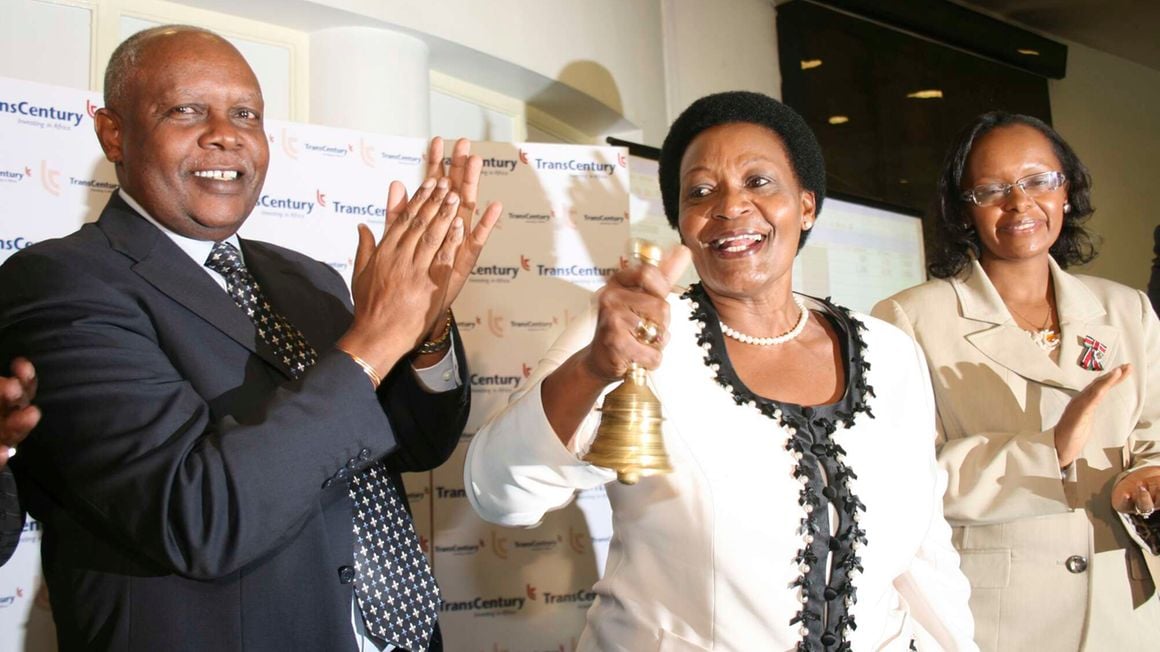
Former TransCentury chairman Zeph Mbugua (left) with Anne Gachui, wife of another former chairman James Gachui during the listing by introduction of Transcentury shares at the Nairobi Securities Exchange on July 14, 2021. FILE PHOTO | NMG
By KEPHA MUIRURI
TransCentury is on the brink. And if the worst happens, and it loses the current court battle it has mounted, it will not go down alone. It will drag down another listed
company with it, East African Cables, in what will dim the dreams of what was once Kenya’s biggest investment firm.The TransCentury story starts some 26 years ago, when an elite club of 26 businessmen drawn largely from Central Kenya formed an investment firm which set out to change the landscape of investing not just in Kenya but the entire East African region.
Armed with a strong funding backbone and close ties with government, the investing club embarked on a journey to become the premier investment vehicle in the region and the continent at large.
By 2007, the then private equity fund had become the deal making machine in town having bought a controlling stake in East African Cables from Naushad Merali’s Sameer Group, Tanzania-based electrical transformers and switch gears manufacturer ABB Tanelec Limited and South Africa’s Kewberg & Braids.
The company had profited from the liftoff in the macroeconomic environment following the 2002 elections as it scaled investing in the energy sector to reap dividends from the growing electricity demand in the country and the entry of independent power producers in generation.
TransCentury would, for instance, create Simba Energy, a consortium which battled other independent power producers for lucrative contracts in the industry. The company would, however, be shaken in 2007 from cracks that emanated from its very founding
Among the 26 business people who founded TransCentury were Eddy Njoroge, a former managing director at KenGen, Michael Waweru, who had been the Commissioner General at KRA, billionaire businessman Jimnah Mbaru, former NSE Chairman James Gachui and businessmen Zeph Mbugua, Peter Kanyago and Joe Kamau.
The founders were believed to have the ear of the then President Mwai Kibaki. While the political ties were partly linked to TransCentury’s rise into the prominent investment company it was, they were equally the curse that rocked the ship.
TransCentury’s purchase of a four percent stake in Kenya Power from the National Social Security Fund (NSE) in 2006 would, for instance, cause a political storm amid allegations the transaction was not above board.
In 2007, TransCentury was forced to postpone a cash call for Sh3 billion on fears that the transaction would be politicised going into that year’s General Election. Attempts to issue the privately placed cash call in 2008 would fall through in 2009 as investors, among other things, fretted over the ability of the Kenyan economy to bounce back from the 2007/2008 post-poll violence.
At this time, the company had strategic interest in East African Cables, Rift Valley Railways, Development Bank of Kenya and Equity Bank. TransCentury’s strategy had been to acquire investments that had a relatively low-cash outlay but possessed growth potential.
Read: The Sh2.8bn debt write-off request that prompted Equity to go after TransCentury
The local and regional environment had, however, was changing fast, with telecommunications, financial services and property becoming some of the new investment areas. The shift prompted TransCentury to seek a diversification of its portfolio.
Having been forced to abandon plans to raise money via private placement, the comapny would list by introduction at the Nairobi Securities Exchange (NSE) in July of 2011 and subsequently leveraged debt as it tried to unlock its next growth frontier.
The leverage on debt would, however, be TransCentury’s Achilles heel as some of its investments, including East African Cables, fell into hard times, characterised by high finance costs and inadequate funds to deliver on contracts.
TransCentury also fell into negative working capital. It has failed to return a profit since 2013, which coincidentally marked the end of the term of then President Kibaki.
In 2016, the company was unable to pay back a dollar-denominated corporate bond, prompting a balance sheet restructure led by Kuramo Capital. Kuramo swooped in by acquiring a 25 percent stake in TransCentury for Sh2 billion as a turnaround investment. The firm would the same year restructure the Sh8 billion bond while handing investors a Sh4 billion loss from a debt haircut.
Read: TransCentury plans sale of Sh1bn properties in Kenya and Uganda
In 2019, TransCentury moved to sell part of its properties with a view of raising funds while it contracted shareholder loans, which peaked at Sh1.9 billion, from Kuramo.
TransCentury’s cash crunch had gotten so dire that the company was unable to pay for the audit of its books in 2021. The firm was left at the mercy of its creditors after becoming technically insolvent and had to undertake numerous debt restructures to prolong the creditors’ call.
Incidentally, another failed cash call this year has left TransCentury fighting for its life after Equity Bank moved to place it in administration and its sister firm EA Cables in receivership. Monday, TransCentury got temporary relief as the High Court issued an injunction suspending the administration process. The investment firm says the bank illegally appointed a receiver while parties were engaged in negotiations.
Read: TransCentury cash call misses Sh2 billion target
“We are delighted to see that the court has seen the irregularity that marred this very unfortunate and ill-intended process. We viewed the bank as a partner and have been in what we saw as positive discussions to arrive at an amicable arrangement just a day before the receiver was appointed by the bank,” TransCentury Group Chairman Shaka Kariuki said.
→ kmuiruri@ke.nationmedia.com




No comments :
Post a Comment